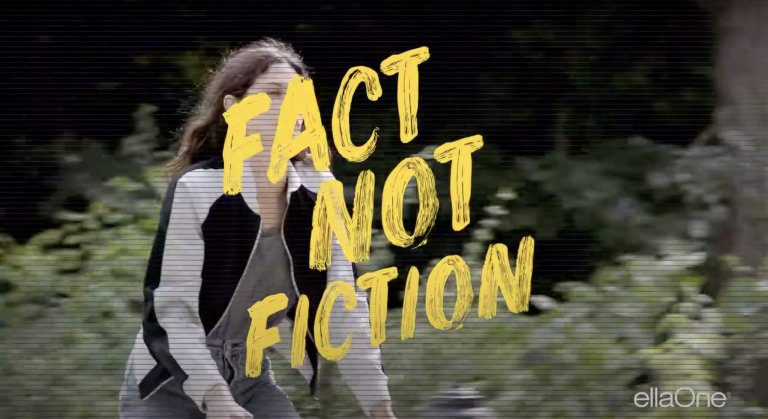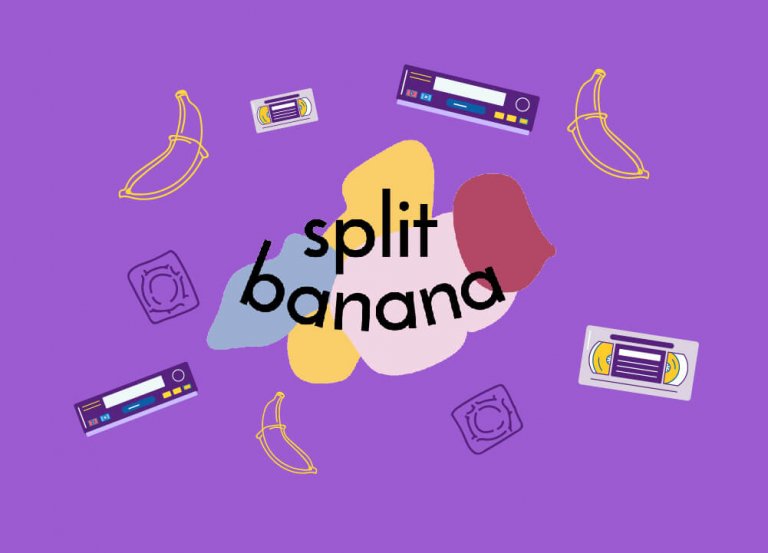“The teachers wheeled in a VHS which showed a video of an animated, naked couple chasing each other around with a feather duster. They jumped under the covers and you couldn’t see what was happening. There were sparks and fireworks and they looked really happy afterwards. There was no further explanation. That’s the most sex education I can remember having,” says Matilda.
Matilda and Anna, the co-founders of innovative sex education program Split Banana, both had bad experiences of sex education in school. When they met on a postgraduate course studying social innovation, they decided to explore what quality sex education could look like. Soon afterwards, Split Banana was born.
They launched Split Banana over a year ago. Their mission is to use an inclusive and artistic approach to convey their message.
Sex Ed Stories
Matilda’s sex education centred around a feather duster, whereas Anna’s was virtually non-existent: “I had one lesson with a 60-year-old maths teacher who got really embarrassed and rushed through it all. Then we were taught railroad safety for two months instead – it is actually quite impressive that you can spread out railroad safety for that long,” she says.
Sounding familiar? Split Banana has an anonymous ‘sex ed stories’ section of their website where users can submit their own experiences.“Our teacher explained contraception by putting on a video of a singing condom,” says one. “We watched a video of a DOG giving birth,” laments another. These 100+ stories, some from as far back as the ‘60s, which are sorted into three categories: Bad, OK, and Non-Existent.
Split Banana’s artistic take on sex education
The co-founders are concerned that the failures of sex education don’t become obvious until teenagers are older. This is because for many students sex education is taught as one-off lessons, something to be ticked off and then forgotten about.
To help with this, Matilda and Anna have created a sex education program made up of four two hour sessions. Students and staff are given a questionnaire to complete prior to the workshop to ensure it’s tailored to their specific needs.
“We believe that you need more than just a half-day or two-hour lessons to learn all you need to know about sex and relationships,” says Matilda, “the teachers are so stretched in terms of their timetable and they’ll often spend half a day on sex education for the entire year and that’ll be it. You need time to build trust with the students so that in the third or fourth session they trust you enough to ask you questions which they wouldn’t have done so before.”
What does a Split Banana sex education workshop look like?
”All our workshops follow a structure which we think of as ‘I, We, Us’,” says Anna, “we begin with the ‘I’, which is ourselves and our relationship with ourselves, our bodies and our mental health. The ‘We’ is relationships, so how we relate to others. The final part is ‘Us’ – so that’s how all the things we’ve been talking about relate to wider society.”
“Tomorrow we’re doing a session which will be all about how to spot unhealthy relationships and questions we can ask ourselves when we’re in relationships. We hope that at the end of the session people will understand where they get their ideas of romance from but also feel comfortable to challenge those ideas,” she continues.
When – or if – you had sex education at school, where you way too embarrassed to ask a question or put your hand up? Split Banana wants to change that.
“Our workshops are interactive,” Matilda says,“we try to make them as engaging as possible because we strongly believe that art and creativity are the best methods for communication and reflection. Young people are far more likely to be able to chat freely when they’re busy making something. Everything we do is done through art, so tomorrow we’ll be making zines – a zine-making workshop on healthy relationships and in that there will be a mixture of collage, drawing, and writing.”
Lack of holistic sex education leads to fiction, not facts
According to a recent survey by ellaOne, only 44% of 18-35-year-olds* were taught about emergency contraception during their school sex education. This may help explain why 41% of the same respondents thought the morning after pill caused a mini abortion and 40% thought emergency contraception could make you infertile if you used it too many times. All of these are untrue.
Matilda and Anna weren’t surprised when they heard these statistics. Anna says she had heard you could only take it four times in one year, while Matilda heard you could only take it four times in your life.
This widespread misinformation can lead to people feeling unnecessarily anxious about taking emergency contraception. “I remember being nervous the first time (I took emergency contraception) and thinking I’d have to get home because I’d bleed loads, but it was fine,” Anna says.
The lack of public understanding about how emergency contraception works can lead to stigma and judgment.
How can we, as a society, end this stigma and empower people to make informed decisions about their bodies?
“I think it comes from still being embarrassed about having conversations around sex and your body,” says Anna, “I think it would help if we stopped thinking that contraception is only the responsibility of the woman and clearly there still needs to be more real talk around the science behind emergency contraception because I think lots of people are still really confused.”
We spend a lot of time looking back at our less-than-ideal Sex Education experiences, and we love that organisations like Split Banana are going out there to make the next generation’s Sex Education inclusive, relevant and FUN! By doing this, they hope to empower young people to have equal, consensual and pleasurable relationships in their adult lives.
Do you want to learn more about the morning after pill? Check out our #FactNotFiction campaign to see how you can help spread facts to help others make informed decisions about their bodies.

*Data from a survey of 1027 British 18-35 year olds.
Words: Sophia Moss
ellaOne® 30mg film-coated tablet contains ulipristal acetate and is indicated for emergency contraception within 120 hours (5 days) of unprotected sex or contraceptive failure. Always read the label.







